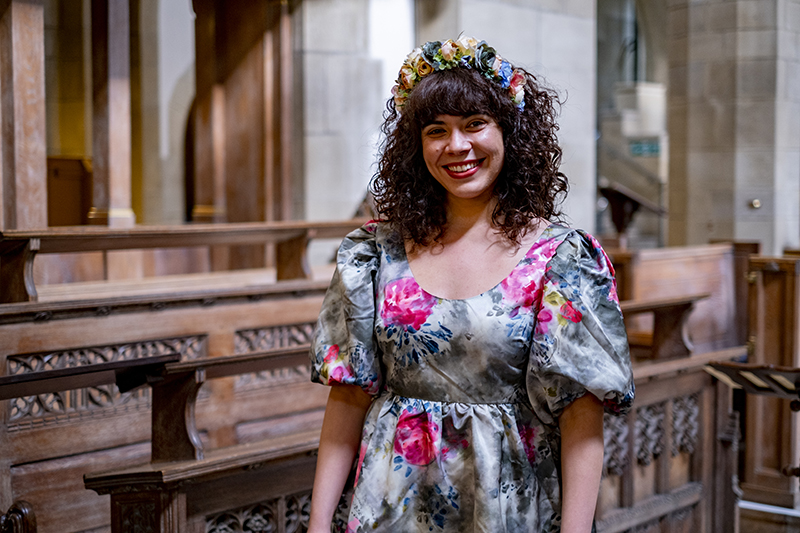On Wednesday 21st September 2022 we welcome organist Rebekah Okpoti to Bradford Cathedral for the next of this season’s organ recitals. Here we find out more about her ahead of this recital, including learning the organ, an organ sonata about Anne Lister, and creating sonic installation art.
Could you introduce yourself, how you got into music / become an organist and your musical journey to where you are today?
Hello, I’m Dr Rebekah Okpoti, Associate Organist at Leeds Cathedral & Lecturer at Liverpool Hope University. I started with the Suzuki method playing the Violin aged 2, then piano age 7. I attended Chetham’s School of Music followed by the Royal Northern College of Music as a pianist before moving on to UCLAN to complete my Postgraduate studies.
In 2016 I had been booked to play piano for a funeral. Arriving at the church they asked if I would play the Organ instead… my response was “ermm ok, where do I turn it on?” – needless to say it was not my best work that day!
I then applied for a job in an Anglican parish, believing naively it was mainly piano based: oh boy was I wrong! It was a full ARCO-style audition, choir rehearsal audition etc, Somehow I was successful and week 1 was learning how to accompany psalms.
I started some light touch organ lessons with an excellent teacher Andrew Dean. He gave me many of the basics of organ playing, but mainly he taught me the job of an Anglican Director of Music for which I am ever grateful. Having grown up primarily in a Brethren church most of the traditions were not similar or even familiar. I have a vivid memory in the early days of the choir members behind me saying, “now, now, go play the gradual hymn… and me loudly whispering back, ‘what’s a gradual hymn?’ with a look of bewilderment on my face”.
At that time I was not a serious student of the Organ: it was functional playing at best. In the January of 2020 I decided I wanted to be an Organist and had been practicing in church a few times a week to varying degrees of success. Then COVID-19 hit and in came the full Lockdown so practicing / learning the organ was not a possibility anymore. So the purchase of a home organ was made: a 3 manual Cavaille-coll replica by Wyvern, that had been custom made for a church in Scotland and needed a new home.
I then started searching for an organ tutor as my lessons had dwindled down due to other Post Grad commitments at the time. I used the Royal College of Organists site to find a tutor and sent an email to Professor David Baker and from that point my playing took off and continues to progress with continued practice & hard work.
I have been so fortunate to be surrounded by other organists who are brilliant and not only give me opportunities but also push my playing. Just over 2 years in and I still want to be an Organist… watch this space!
What can people expect from your recital at Bradford Cathedral?
In 3 words the recital will be playful, capricious & whimsical.
Why do you enjoy playing the organ?
My background has included copious amounts of music production, primarily recording, sampling, and more recently synths. Sampling is the creation of, or reuse of, a portion of a sound recording. They are typically unusual sounds – so it could be things in nature, unusual or homemade instruments: the sound of your kitchen utensils being used, a piano, piece of metal or anything that makes a sound.
Samples may comprise elements such as rhythm, melody, speech, sounds or entire bars of music, and may be layered, equalized, sped up or slowed down, re-pitched, looped, or otherwise manipulated.
Playing the organ is in many ways a live version of this creative process. There are so many possibilities with registration & acoustics its all about what you hear coming back at you from the instrument & space. In a word – “Mega”.
Do you have a particular favourite piece out of those you are playing?
In this recital I will be playing my new Organ Sonata – Anne Lister’s Organ Sonata (BBC’s Gentleman Jack). This piece was commissioned by the Anne Lister Festival, It premiered in April at Halifax Minster & is touring the country. The score is available to purchase from Tim Knight Music Publishers as a Hard-Copy or Pdf.
If you come along to the Recital you will be able to find out the story behind it. BBC radio Leeds & Bradford said it is a “groundbreaking piece of contemporary classical Organ music & a tribute to Anne Lister and Halifax link none other.”
Each recital this season includes a piece from The Orgelbüchlein Project – what was it like learning this piece / why did you pick that particular piece?
This was a really exciting opportunity to learn some new music, I am a big fan of learning new music and including it into recital programmes.
You are a lecturer at Liverpool Hope University. What is it like to teach music?
Being able to Lecture & Research music at Hope is such a fulfilling job. There is an excellent & supportive team in the Creative Arts Campus and student experience at the university is some of the best in the country. Liverpool is a thriving musical city and Hope has the advantage of strong connections to the Cathedrals, which is the perfect place to be as an Organist & Academic. Hope also has a comprehensive organ scholarship package available for students.
You’ve also published a thesis and Create Sonic Installation Art – what was that on, and what was it like to create that?
Along with being an organist I am an Academic. A thesis is the large piece of writing around 100k words and practice/practical element for the award of a PhD. My thesis title was “The Repatriation of Domesticity in Sonic Installation Art” in simple terms this looked into the Philosophy of the Domestic, Space, Poise & Repatriation outside the feminist critique using something called a Sonic Diary (think about journaling but in sound rather than words) as a tool & process for composing new music.
Sonic Installation Art is the technical term for Sound/Music or Audio in a Gallery or Art setting. Sometimes the Sonic element is supportive; sometimes it is the art itself. You can View my Finding Home collection which has been presented in USA, China & Georgia online.
During the pandemic you created some ‘Experimental Organ Music’ – what did that involve?
Yes, my first Album ‘Dressing’ was released by a label called SetFootPress who specialize in site-specific compositions throughout Lancashire. You can listen/purchase this digitally or on Cassette Tape. This uses the organ in different ways along with other instruments such as strings, piano or bells but also uses non-traditional instruments such as the Looms at Manchester Museum of Science and Industry or the Metal Lithography plates from Analogue printing amongst many other sounds. This is super fun to create as it introduces new and different audiences to the organ.
My second album is in post production at the moment and will be released in the USA by Yuggoth records, so keep an eye out – there is even more explicit Organ on this album.
Finally, how would you sum up your upcoming recital at Bradford Cathedral?
I am super excited to play your wonderful organ at Bradford cathedral and such a privilege: thank you for inviting me! It is always an adventure playing new instruments with new acoustics. Bradford radio and people have been so welcoming of the new Organ Sonata back when it was premiered in April so it is exciting to be able to play it live to you all. I would sum up the recital as an opportunity to hear new music but ‘pleasant’ music rather than discordant. This recital sits Liszt with contemporary interpretations of Bach and it is exciting to be at the front of a new genre of organ composition.
You can find out more about Rebekah on her website, Facebook, Twitter, Instagram, and YouTube, as well as on Twitch, TikTok, and Discord – @thegirlyorganist. Rebekah is also starting a blog in 2023.
You can join us on Wednesday 21st September at 1pm for Rebekah Okpoti’s organ recital, with an optional £4 buffet lunch beforehand at 12:30pm.
You can discover more about our organ recital season on our dedicated page.

